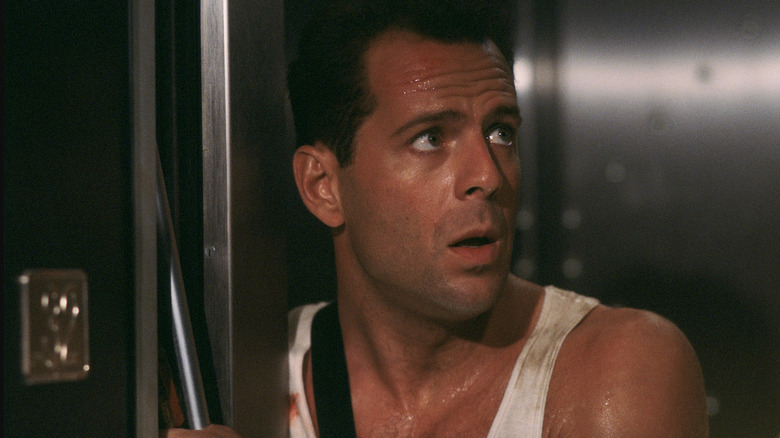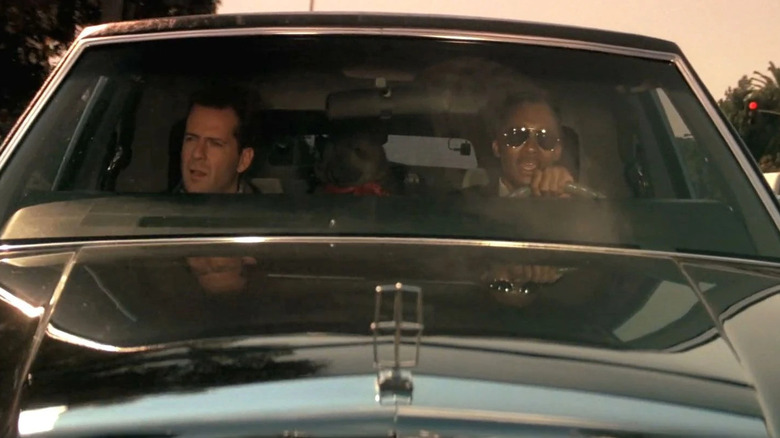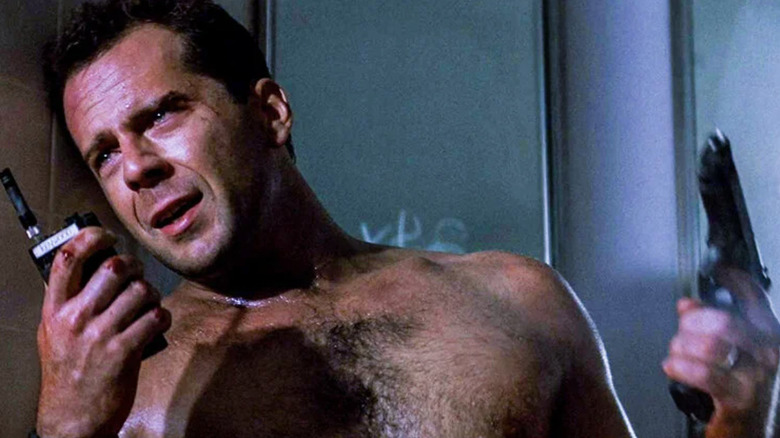The Answer To Whether Or Not Die Hard Is A Christmas Movie Is Found In One Scene
It's the holiday season, and with it comes all of its attendant traditions. Keeping tradition is a useful and important part of life, as it reminds all of us who we are and how far we've come while reorienting us for the future. It allows for reflection, too, letting us re-examine and take stock of our institutions and traditions themselves, seeing how much value they retain while adjusting them if necessary. For many, 1988's "Die Hard" has become a staple holiday season viewing. Yet watching the film is a tradition that has begat a new tradition of its own: debating on social media whether "Die Hard" actually is a Christmas movie or not. For those of us eager to enjoy our annual viewing of director John McTiernan's action classic unadorned, this debate is a tradition we'd rather do away with, but it's sadly one that keeps returning every year.
How to end this debate is a matter of some difficulty. Both sides have presented their case with equal passion: the true believers insist that the film is suffused with a holiday theme, the doubters insist that Christmas is incidental to the plot and characters, while the agnostics try to balance the two by distinguishing between a Christmas movie and a movie with Christmas in it. This last point is the trickiest because the definition of "a Christmas movie" means different things to different people. For any film to be declared a Christmas movie, we must agree that such a thing can and does exist, and that, at the very least, a Christmas movie must contain both the visual trappings as well as some of the spirit (positive or negative) surrounding the holiday.
Using that definition as our baseline, we must then find authoritative proof as to why "Die Hard" is a Christmas movie. Unlike the lawyer Fred Gailey from "Miracle on 34th Street," I can't simply rely on people's officially published opinions or sentiments. So why not use the movie itself? That's right; decades before this question became a meme on its own, "Die Hard" introduced the debate into the body of the film itself, anticipating such a reaction while using the same moment to further the movie's character and theme.
'Die Hard' addresses its Christmas movie status before the opening titles are over
As anyone who's studied "Die Hard" knows, the film contains a rock-solid sense of structure, with its composition, blocking, dialogue, and performances working in total concert with each other to set up and pay off every element introduced in the movie. As such, its opening titles, which stretch from the very start of the movie to eight minutes into the film, contain a wealth of information about the characters, spaces, situations, and themes to follow. From a Businessman (Robert Lesser) telling John McClane (Bruce Willis) to make "fists with your toes" to get over jet lag to the establishment of the Nakatomi corporation and its Christmas party, the opening of "Die Hard" is a true holiday table setter.
Right as the titles are beginning to come to an end and the Nakatomi building looms closer, Argyle (De'voreaux White), the limo driver hired to shuttle McClane to the building, suggests throwing on some music. As the strains of Run-DMC's "Christmas in Hollis" plays over the limo's sound system, McClane rolls his eyes. "Don't you got any Christmas music?," he complains, given that it's Christmas Eve. "This is Christmas music," Argyle replies with assurance. The rest of the titles follow over an establishing shot of the limo pulling up at the front entrance of Nakatomi Plaza while the song continues.
With this moment, McTiernan, writers Jeb Stuart and Steven E. de Souza, and "Die Hard" itself are announcing its intentions and seeking to preemptively quell naysayers. The choice of "Christmas in Hollis" is to demonstrate how this film is going to be energetic, irreverent, hip, and even a little subversive, all while still retaining a holiday theme. In this fashion, Argyle might as well be talking to the audience, insisting that "this IS a Christmas movie" while the film deviates from the typical holiday scenes of cold, snowy streets, family dinners at suburban homes, the exchanging of gifts, and so on. "Christmas in Hollis" even encapsulates this expanded definition of what Christmas is, with Run-DMC relating their tale of an East Coast, Black-culture-infused holiday celebration. With this scene, this dialogue, and this needle drop, "Die Hard" cements its status as an official Christmas movie right from the jump.
Why 'Die Hard' espouses the spirit of Christmas
The scene doesn't just act as a declaration of the film's holiday movie identity, however. It doubles as a further setup for McClane's character arc, something which ties into the Christmas themes of "Die Hard." At the beginning of the film, John McClane is a cocky, critical, arrogant, and selfish man: he can't help but judge the public displays of affection he sees around him with derogatory mentions of "California," he stupidly lets a moment of renewed affection between himself and his estranged wife, Holly (Bonnie Bedelia), turn into a fight over her decision to use her maiden name professionally, and he subtly confesses to Argyle that the real reason he didn't move to Los Angeles to be with Holly six months prior is that he believed her career wouldn't take off. When Hans Gruber (Alan Rickman) and his band of thieves arrive to hold the partygoers hostage while they rob the building of all the money in its vault, McClane has the opportunity to sneak away and either hide until it's all over or try and escape the building unnoticed. It's because he decides to do his job and think of others besides himself — Holly, Argyle, his eventual newfound friend Al Powell (Reginald VelJohnson), and the other hostages — that he stays and can beat the odds and not only survive but foil the selfish thieves' plans.
The seeds of this growth can be traced back to the movie's opening moments: McClane takes the advice of the Businessman and is surprised to learn that making fists with his toes does help him feel better (even though it becomes a liability for him later). Perhaps he was further inspired to stay once Hans arrived due to the kindness Argyle demonstrated by offering to wait in the building's parking garage for McClane in case he needed a ride to a hotel. Maybe McClane took Argyle's insistence that "Christmas in Hollis" is Christmas music to heart — after all, the 1987 single did mark a milestone for Run-DMC and hip-hop in general, representing the growing popularity of hip-hop via its inclusion on a charity holiday record without the group or the song being commercialized and made inauthentic.
The fact is, Christmas and "Die Hard" contain the same core tenet, which is selflessness. McClane can achieve victory not through acts of superheroism, cunning, or might. He and the other heroes of the movie survive due to taking action on behalf of others and at their own expense, whether it's Argyle crashing the expensive limo he doesn't own into a villain's getaway vehicle or Holly sacrificing her new Rolex watch to finally stop Hans' misdeeds. Ironically, it's in the spirit of the movie and the holiday which allows the debate around it to never truly end, because everyone deserves the freedom of their own beliefs. So, for now, I'll say that to answer the question of "Die Hard" being a Christmas film or not, one has only to watch the movie itself. Merry Christmas, pals!


